Warning: This review will contain spoilers for The Village
A small village lives from the rest of the world in the woods, where they go abound their lives whenever a scary creature comes in and creates fear within the village. But one couple will come in to show the power of love and how their love can potentially save them form the horrors that lives inside and outside of their protective areas.
There’s no denying that M Night. Shyamalan is one of the most creative and most unique directors working today, and one of my personal favorites as well. I mentioned this in my review for Trap, but throughout his body of work, he often brings out the most interesting approaches in making very real and inmate stories about people dealing with the horrors and the unknowns within their lives (both internally and externally) and trying to live a better and peaceful live despite of it, and often tell these stories through conventional genre like storytelling. From dealing the loss of life while having the ability to see dead people in The Sixth Sense, to rediscovering yourself and your faith in other people amidst an alien invasion in Signs, to understanding and discovering what it means to use the power/gifts you have in his Eastrail 177 trilogy of Unbreakable, Split, and Glass, Shyamalan has always placed the humanity of his films first and foremost so that so many other elements of his films like his use of tension and suspense and clever concepts and twists can shine brighter than they already have otherwise. Sure he has his share of stinker films (including one in particular I won’t say, but you can probably guess what I’m referring to), but when he gets it right, it’s truly magical to watch and be amazed by how a talented filmmaker he can be.
However, when it comes to the question of what film is his masterpiece and best demonstrates what makes M Night. Shyamalan such a talented filmmaker, my answer to that question is his 2004 romantic thriller, The Village. Which just so happened to also be my personal favorite of his films as well. Despite receiving mixed reactions upon its release, it has garnered a revaluation from many film fans alike, and has declared it as one of M Night’s best works, and it absolutely deserved it. Because in my opinion, no other film in his filmography better demonstrates all the strengths he has a filmmaker and taking it to an insane level that he hasn’t top in the 21 years since its release. But how did he do it? What makes The Village his masterpiece? Let’s find out.
Right from the opening scene, we are put into the world of this village that represents 19th century Pennsylvania, where the people in the village go about their routine of normal life, host dinner parties, have council meetings, and falling in love with other people. All the while living in constant fear of the creatures living within the woods that surrounds the village and are not allowed to enter the towns in the process. Shyamalan puts emphasis on the themes of fear and protection within the first scene, and how that affects the community of people living in these villages. They constantly live fear and sheltered themselves from not going into the woods/outside world, but still experience the every day struggles such as death, sicknesses, trying to find the right person to marry, etc. He brilliantly sprinkled the many twists and plot development presented in The Village to allow us get invested into the world, but not too much where it reveals everything at once.
It’s also worth noting that within the opening few mins, the film puts emphasis on ominous and terrifying sounds from the woods. Often to represents the illumining presence of the creatures living within the woods, and how their presence places fear on most of the people living in the village (except for Noah Percy, played by Adrian Brody, who seems to be excited when the sounds come around), and shortly after, we get a montage of the community living life as James Newton Howard’s incredible score plays over it to show that even living in constant fear, life goes on and the best they can do is to live as peacefully as they can, while trying to protect themselves from the creatures coming in and possibly destroying their livelihood. But living the lifestyle the people in the village have created for themselves isn’t the most healthiest of ways (more on that later).
But also within that framing device established in those opening moments, Shyalaman masterfully lays the ground work for the themes of faith, hope, and love to sprinkled into the story within this film. Not only showing how the community puts hope and faith that they will survive based on how they live within the village and the accustoms they’ve known for so long (even if it’s not the best ways of doing so), but also allowing for certain people within the village to willing to take that leap of faith and show a way of living life without any fear being driven within them. And there are two central characters that ultimately challenge the ideals driven by the higher ups of the village and make it a better place to live.
The first is Lucius Hunt, played expertly by Joaquin Phoenix. Lucius is someone who gives the thoughts and feelings of others whenever they are scared, hurt, or they need some form of protection first before the feelings of himself for the most part. From the first scene we see of him reading out a letter asking the elders (including his mother) of the village to travel into the woods and find the nearest town to give new forms of medicine after the passing of little Daniel Nicholson, we see how selfless and how unafraid he is when so many others are afraid, because he knows the dangers that lied ahead but isn’t consumed too heavily on them. He values the lives of others so much that he’s willing to put himself in impossible circumstances to show not only his lack of fear, but his love and empathy towards others including his mother Alice, Finton Colin who watches by the tower to keep an eye out every night to see if there’s any creatures rumbling in the night, and of course Ivy Walker, even when they don’t sees or knows what goes inside of his mind and why he acts so differently than the rest of the village. Even when he does goes out and rejects the feelings of others such as when he rejects Kitty Walker’s romantic feelings towards him or when he tries to reason with Noah and how he feels about Ivy despite being stabbed by him , he never bursts into anger or hatefulness, but rather as a sign that he respectfully doesn’t value the same feelings as them (side note, the cut from Kitty confessing her love to Lucius to her crying in Ivy’s lap is such a sad but hilarious moment that I bet many people who were in her shoes at some point can definitely relate to). He’s scared yes, and he knows that something more mysterious that lives in these towns, but he never once let it define his actions and the core values he stands by, because he knows that it’s better to confront it than to live life with a sense of ignoring the past and ushering a life filled with love and peace and understanding of who we may are in the past, doesn’t have to defend us now. Such a well define character despite being the lead in the first half only due to him being stabbed and resulting to him being wounded, and Phoenix gives a tremendous performance. Capturing Lucius’s compassion, fear, and determination with a sense of depth and depth through the soft and tender vocal speeches and the affective way he moves around his body and plays into the environments around him so affectively.
Now, the reason why I said Lucius is the main character for the first half of The Village, is because he shares the same screen time and ultimately switches focus to the second character that challenges the ideals driven by the higher ups of the village, Ivy Walker, played spectacularly by Bryce Dallas Howard. Much like Lucius, Ivy is someone who puts the values of love and empathy towards others above everything else and what drives her to keep living despite of her being blind. Which evidently shown in her first scene when she’s comforting her sister Kitty after being rejected by Lucius and singing a lullaby to calm her down and letting her know that time will heal and she will find love one of these days (which Kitty did eventually did through marrying Christop Crane). But even with her blindness, she sees so much good within the world and the way people are liked based on the sense of color they have (which she emphasizes on how it’s the only thing she sees in the darkness and how she won’t tell Lucius his color) but also recognized when things seems to be off and when people aren’t acting as appropriate as they should have, especially when it comes to adjust to Noah’s behavior and means of action. As the film progress, as we see Ivy becoming more of the focal character we’re following through, we see how Ivy has become more truthful to her beliefs and her desire to protect those she loves so dearly like Lucius, despite being fearful of what’s in the woods and the dangerous creatures that lies within it. She’s scared, but she’s doesn’t let that fear drive her to see that the village can be changed for the better if everyone who lives it in a sense of fear but through love and compassion that will never be broken. She’s the beating heart of this film, and how she persevered through every situation she’s placed in despite being blind and not seeing everything but only capturing the sounds and feelings around her is what makes her so compelling. Plus, Bryce Dallas Howard is absolutely perfect in this film (honestly she gives my favorite performance in any Shyamalan film), as she perfectly captures Ivy’s warmth and compassion through the way she delivers the dialogue (as well as having the moments of laughter and delightful energy being real and authentic) but also capturing her sense of fear and dread the second she goes out into the woods and is confronted by the creatures that inhabited it. Also on a side note, as an autistic person, I related so much to Ivy through her actions, her outlooks in life, her sparky and gentle attitude and the kind hearted personality she has inside of her.
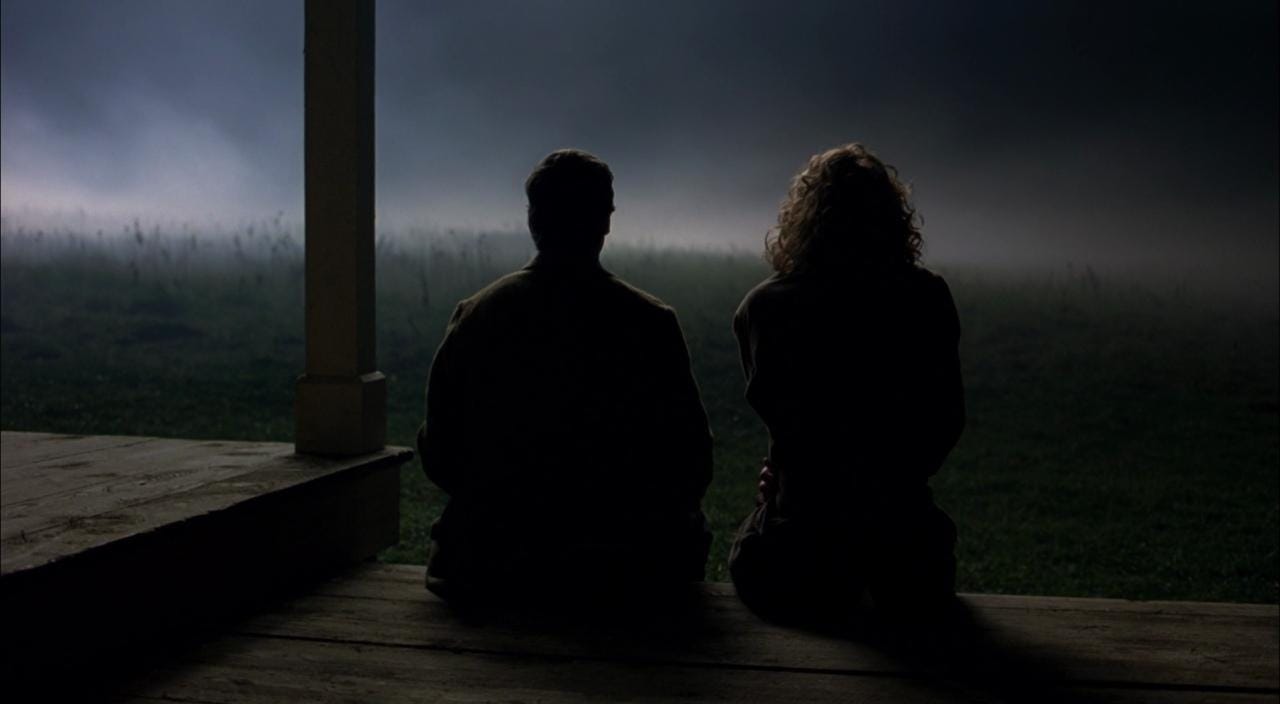
Understanding who Lucius and Ivy are individually is no better way to understand them when they’re together romantically. There’s something so genuine and real about their chemistry that drives so much of the films narrative and themes about love, faith, and hope. As mentioned before, both Ivy and Lucius have their views and approaches towards how they share love and compassion towards others, but both present them in ways that feel true to themselves. The spark and chemistry between them is based on honesty and truth, because their love isn’t stemmed from the need of any form of fear and tradition that’s set by the town at hand, but rather seeing them as putting each other before themselves and are willing do to anything to protect each other from any harm and danger that lies ahead, and we do see how both Ivy and Lucius put their love for each other amidst the danger that lies ahead of them, such as Lucius pulling Ivy into her home away from the monster that invades the village and when Ivy literally goes out into the woods in the hopes that she will find the medication she needs to help cure Lucius from the wounds he received.
But the scene that best sums up the romance between them is my favorite scene of the film, the porch scene shortly after the sounds of the monster lingering over Kitty and Christop’s wedding. The scene starts when Ivy notices Lucius is sitting by her porch and begins to sit by him despite being cold outside. The conversion sparks when Ivy asks Lucius why he’s sitting on her porch, which Lucius replies that it’s too dangerous for her to be out there, and then Ivy asks how she channels more of a Tomboy personality compared to the other women in the village, and why Lucius doesn’t drive by fear whenever the town is driven by it. It’s Ivy’s way to better understand his mindset and drive in his life, before asking him this simple yet beautiful question that makes my heart melt:
“When we are married, will you dance with me? I find dancing very agreeable.”
Lucius proceeded that question that he doesn’t speak every thought he has in contrast to Ivy speaking every thought she has. But it’s through his responses, we learn that the only time he feels fear is when he fears that the ones he loves so dearly will be danger and be put in harms way, which follows into how he constantly has Ivy in his thoughts because he loves her so dearly and is scared that something bad will happen to her. He’s so scared that he begins to shaken up in potential tears and have a shaken tone in his voice (which Phoenix absolutely sells in this scene), and returns to the question Ivy asks him before:
“And yes, I will dance with you on our wedding night.” My heart is so pure for them.
This scene best showcases what Ivy and Lucius’s love for each other. A love where they grow to care for each other. A love that will be gone if one of them is gone form this planet. A love that they will do anything and put them at risk to make sure the other are safe and sound. A love that is so real and powerful that it could change the future and lifestyle the world has in store for them. That’s the love we all want in our lives, myself included and M Night shows that love within Ivy and Lucius so authenticity real and honest that they value each other before others, including themselves. Plus the chemistry between Joaquin Phoenix and Bryce Dallas Howard is so beautiful that shows that love is more than just cute looks and kissing mode, but rather comes from a place of understanding and how they are so scared of loosing each other that they will put themselves in front a knife to protect each other. That’s real love.
The Village doesn’t only work on an emotional level, but also on a filmmaking and symbolic level. As Shyamalan expands the themes of love, fear, terror, and hope into the presentation aspect with flying colors.
First off, the cinematography by Roger Deakins is simply outstanding. Creating a sense of lively atmosphere present at every corner, whatever it be a wide shot of the villages and forests around the characters and their ways of living, or a simple close up to get the expressions of the characters at their most happiest, scared, or any form of emotion they’re feeling, or to highlight the importance of a singular object like a hand reaching out to the unknown or a creature creeping up and killing anything that could come in its way. The Cinematography provides these feelings with the way he and Shyamalan frame each shot to help get the audience invested into the world and emotions of the story slowly but surely unfolding the longer it goes on. This even expands to the choices of color and the symbolism each color represent. Like Red in this film represents danger and fear, as the red cherries Noah picked up for example shows how dangerous the creatures can be lurking around the villages themselves (even expanding to the the creatures being covered in red clothing to represent that sense of fear and terror as well), while colors like yellow represents light and hope amongst the danger that lies ahead within the village and beyond it, especially when Ivy takes the risk of walking outside of the villages in order to get medicine for Lucius because of her empathy and compassion is stronger than anything else while wearing the yellow jacket and how dirty it becomes the longer she wears it.
The score by James Newton Howard is also incredible, and well deserving of its Oscar nomination. As he provides a sense of suspenseful creepiness when it wants to focus on the uncertainty and fear most of the village feels when the creatures are creeping in while giving something grand and whimsical when the personal feelings these characters such as Ivy and Lucius when they’re feeling happy, joyful, and securing of their love. It helps makes the experience of watching The Village feel alive and allowing you to feels these emotions without coming off cheapened or manipulated, but rather it’s part of the film itself. Even with the brillant sets and costumes help created the atmospheric 19th century feel Shyamalan approached with the film at as well to help emerge and engaged into the world it presents itself.
Now, I want to talk about the twist in The Village and how it had made or break the film for a lot of people. The twist being that the 19th century Pennsylvania is actually elders from the late 20th-early 21st century created under the foundation of each of them experiencing loss and grief in their lives and how they created the 19th century period as a way to escape of the trauma. As well as the creatures being revealed as people wearing costumes to help make those in the village believed there are monsters running around the village, including Noah Percy being one of the people who wears those outfits. Now I’ve seen people saying that the twist ruined the experience of the film, say how it reckons the whole picture and all that jazz. But I think the twist works for several reasons.
First, the chest that holds the elders secrets was established earlier in moments such as the one when Lucius is talking to his mother about he’s not the one who’s holding secrets and even points to the chest to her, which gives us the audience the hint that there’s something more going on in these villages than what many would to believe in. Second, the elders hiding their past ties back to the themes of fear and the lack of faith within oneself, as they run away from their past lives and current world makes them deny confronting the struggles and problems that lies outside of the fantasy world they live created for themselves. But it also shows a sharp contrast to Ivy and Lucius, who faced their fear of what’s around them and how what they do for their love redefined the purpose of building community and confronting the internal and external struggles within themselves and the world around them. This is also aid to characters like Edward Walker and Alice Hunt providing the love and insurance to their daughter and son respectively that no matter what lies ahead is to never let those fears and discrimination never get the best of them. Another sharp contrast to characters like Noah, who’s so attached to his jealousy for Lucius and desire to be loved by Ivy that he allowed his worst feelings get the best of him, and lead to his demise as he fell down into the pit while dressing up as one of the creatures trying to attack Ivy in the forest.
M Night didn’t pull the twist out of nowhere, he cleverly hinted at the twist throughout the film and sprinkled that there’s more to these villages and creatures than meets in the eye. Plus, as I mentioned earlier, it goes back to the themes and adds a deeper layer when placed into the perspectives of characters like the elders who are ashamed of their past and creates a place where fear is rampant in ways to live in a bubble where they’re scared to pop out, while characters like Ivy and Lucius aren’t afraid to burst that bubble and challenge the status quo and what it can mean the future of the village itself, because of how much they put themselves and their love as the end goal of whatever they’re doing. Plus in the moment where Ivy goes out and asked the park ranger that’s near the woods that she needed meds for Lucius, she doesn’t care about the state of the world she’s in. All she cares about is Lucius and doing everything she can to make sure he survives so they can dance on their wedding night, no matter the cost. Making the twist all the more affective.
I can gush about The Village forever and why I think it’s M Night. Shyamalan’s finest achievement as a filmmaker. From it’s brillant concept, to it’s level of symbolism, to the incredible filmmaking on displayed, to the fantastic performances, to how everything in the writing, characters, and themes tie together in such fantastic fashion. It’s far from the horror film that the marketing of this film lead audience to believe in, but rather a tragic and hopeful romance about two individuals falling in love and by their strength and willingness to do anything for them no matter the cost, can help shape the community around them and sees the value in life when they don’t put themselves in a bubble of hate and denial but embrace the flawed world through love and compassion. This also makes as one of the best post-9/11 films about facing our fears and seeing the world beyond the grimness presented on the surface, which is only a message and statement that has only grown more and more with time, especially with how everything in our current world is looking. This is Shyamalan’s at his most human, most raw, most terrified, and most beautiful. Seeing the potential humanity has if they put the loves for others and the faith they have above any fears or doubt living in them. We all have the ability to be like Ivy and Lucius if we try, and this film demonstrates why so perfectly. It’s a film that has mean so much to me and will continue to resonate with me and so many others who are willing to listen for years to come.
Final Rating: 10/10 - “Absolute Perfection”
If you want more of my taste in films, feel free to follow my Letterboxd account.

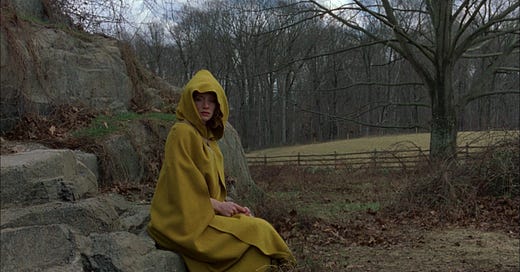




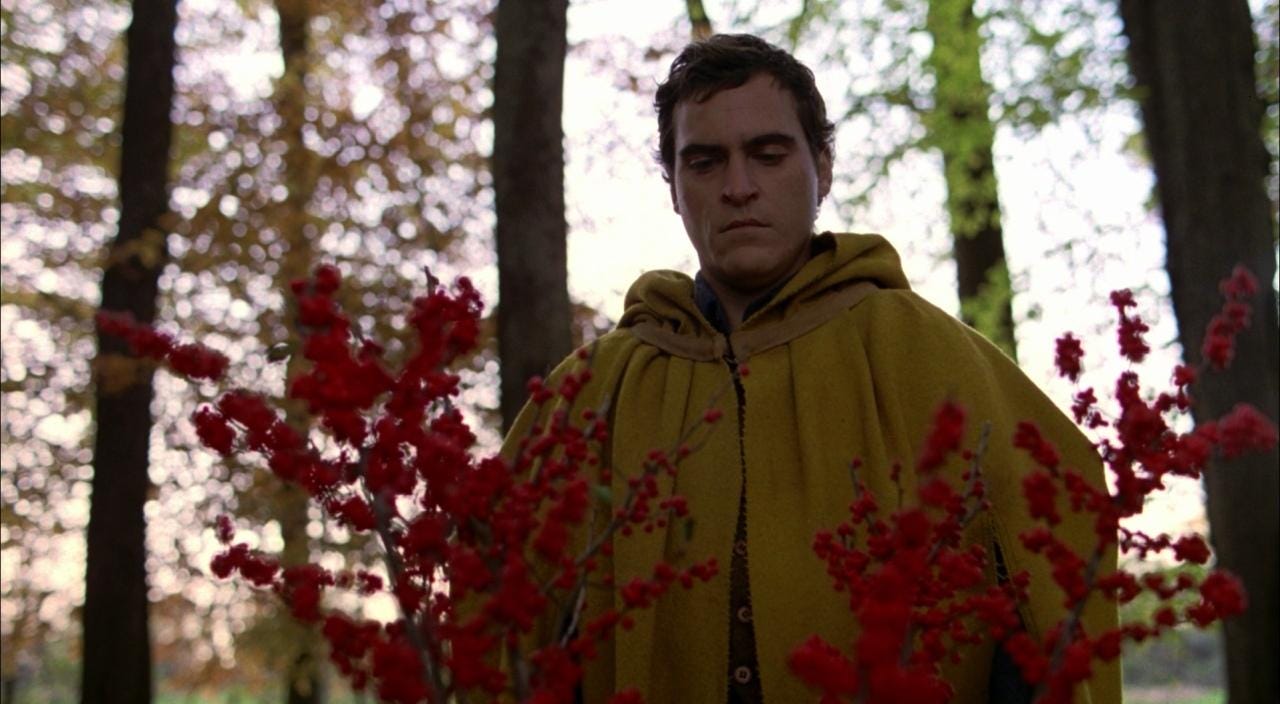

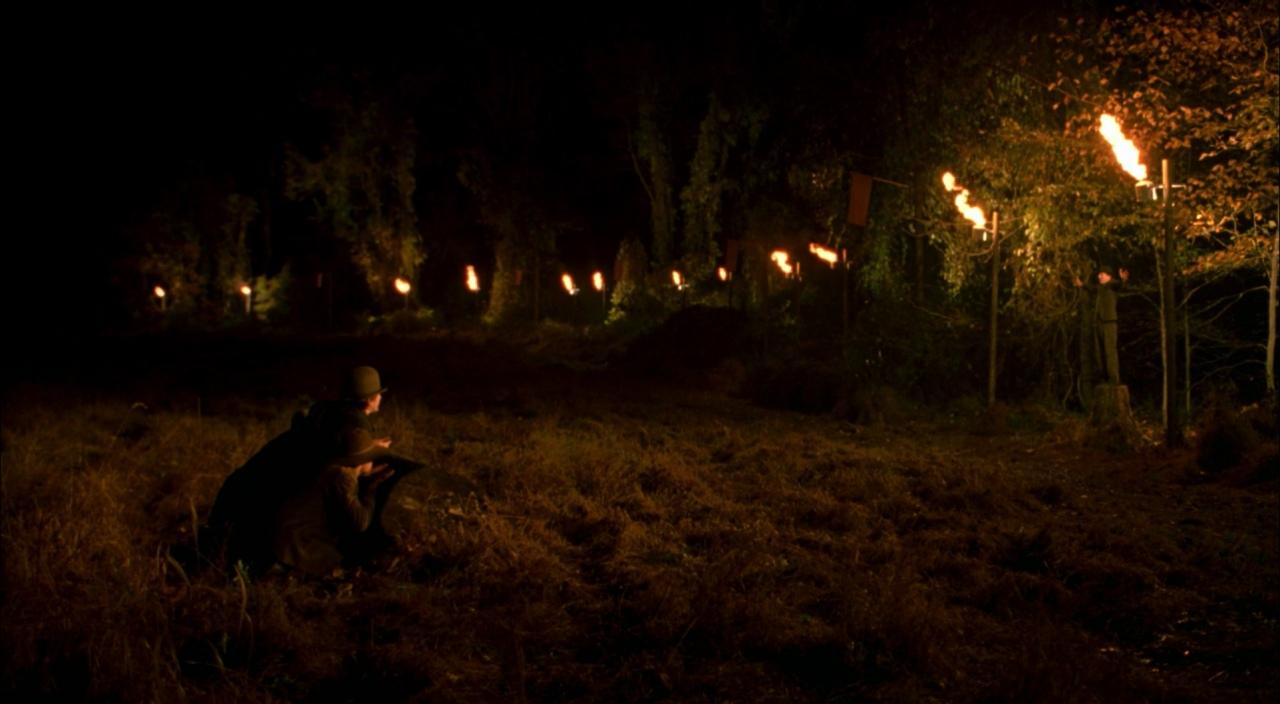
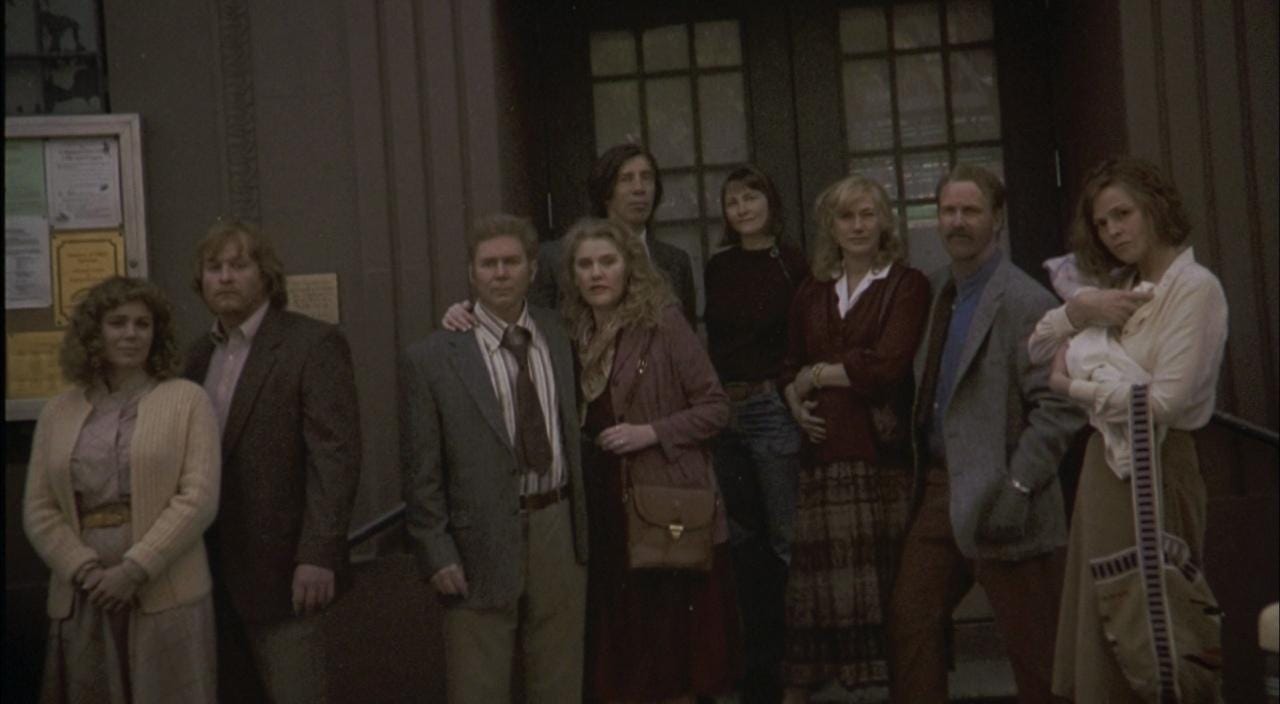
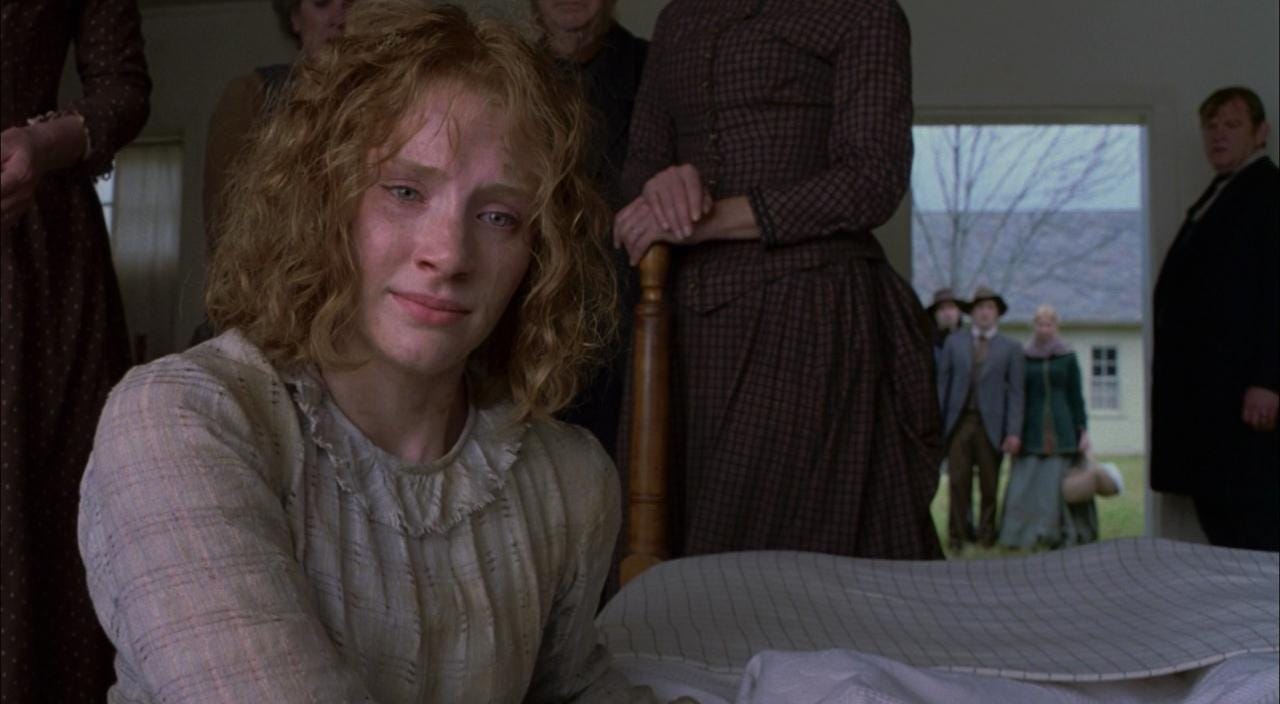
Glad to see and read The Village getting the love it deserves. It is also my favourite M. Night film! This was an excellent read, really enjoyed your insight on how the theme of love and optimism shine through the terror.